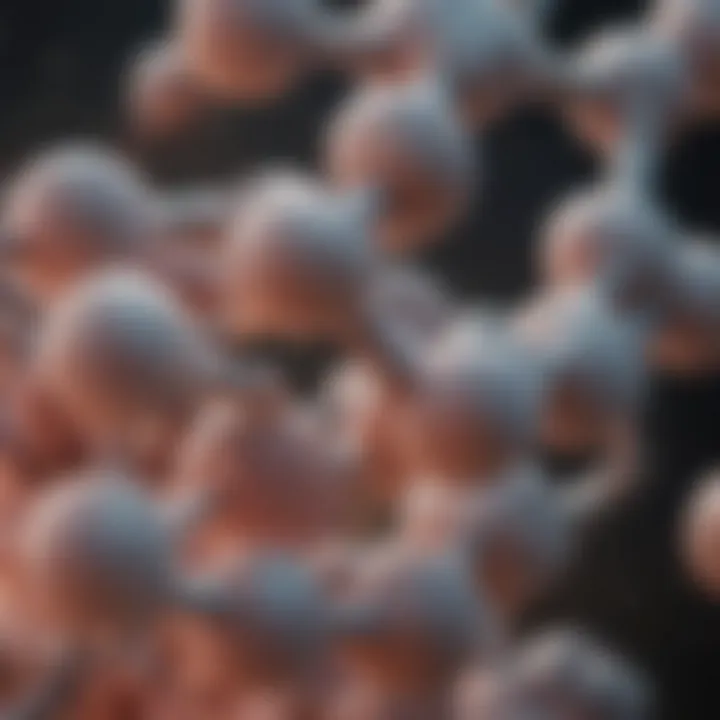Exploring Lysine's Efficacy in Cold Sore Treatment


Intro
Cold sores, commonly caused by the herpes simplex virus (HSV), affect a significant portion of the population. They can be painful and unpleasant, often impacting social interactions and personal confidence. Recent research has brought attention to the amino acid lysine as a potential player in the management of these outbreaks.
Understanding the role of lysine in relation to herpes simplex virus can offer valuable insights for health professionals and individuals hoping to reduce the frequency and severity of cold sore outbreaks. This article will explore the biochemical mechanisms through which lysine operates, its dietary sources, and practical tips for its use in conjunction with traditional treatments.
Health Benefits
Lysine has been suggested to offer several health benefits, particularly in the context of preventing and managing cold sores. Notably, its biochemical interactions with the herpes virus can have implications for those who experience frequent outbreaks.
Physical Health Benefits
Research indicates that lysine may inhibit the replication of the herpes simplex virus while supporting immune function. Here are some key points:
- Antiviral Properties: Lysine appears to compete with arginine, an amino acid necessary for viral replication. By reducing arginine levels, lysine may effectively limit the virus's ability to multiply.
- Immune Support: Supplementation with lysine could enhance immune response, which is crucial during an outbreak.
- Pain Reduction: Some research suggests that lysine may help alleviate the discomfort associated with cold sores.
Mental Health Benefits
While the primary focus is on physical aspects, there are also potential mental health benefits associated with lysine usage for cold sores:
- Reduced Anxiety: Fewer cold sore outbreaks may contribute to lower anxiety levels related to social situations or self-image.
- Enhanced Confidence: Managing cold sores effectively might lead to improved self-esteem.
Practical Tips
Lysine can be integrated into one’s routine in several practical ways, enabling individuals to take proactive steps in managing cold sore outbreaks.
Healthy Eating Guidelines
Dietary sources of lysine can be incorporated into meals. Here are some food items rich in lysine:
- Meat: Beef, chicken, and pork are great sources of lysine.
- Fish: Fish such as cod and sardines provide good amounts.
- Dairy: Milk, yogurt, and cheese are also rich in lysine.
- Legumes: Lentils and beans can help increase lysine intake for those following vegetarian diets.
- Nuts: While many nuts are low in lysine, peanuts are a notable exception.
Effective Supplementation
If considering supplementation, it is important to follow some guidelines:
- Consult a Professional: Always consult with a healthcare provider before starting any new supplement regimen.
- Choose Quality Products: Select high-quality lysine supplements from reputable brands to ensure efficiency and safety.
- Stay Informed: Regularly update your knowledge about current research on lysine and its effects on cold sores.
"Emerging studies continue to shed light on the importance of lysine in managing cold sores, providing hope for those affected by recurring outbreaks."
Armed with a deeper understanding of lysine's role and practical tips, individuals can make informed choices that might lead to better outcomes in managing cold sores. This comprehensive approach combines biochemistry with actionable guidance, productively bridging the gap between dietary habits and effective treatment methods.
Understanding Cold Sores
Cold sores, often known as fever blisters, are a common viral infection that affects a large portion of the population. These small, painful sores usually appear around the lips and mouth. Understanding this condition is crucial because it not only helps in recognizing early symptoms but also enhances the knowledge of prevention and treatment options, including the potential role of lysine.
What Are Cold Sores?
Cold sores are caused by the herpes simplex virus, primarily type 1 (HSV-1), although type 2 (HSV-2) can also be responsible. They typically manifest as clusters of fluid-filled blisters that eventually break and crust over. These lesions are contagious, particularly during outbreaks, and can be transmitted even when sores are not visible. The psychological impact of cold sores can also be notable, affecting one’s confidence and social interactions.
Causes of Cold Sores
The herpes simplex virus remains dormant in the body after the initial infection. Various triggers can lead to an outbreak, including:
- Stress: Emotional or physical stress can weaken the immune system, making outbreaks more likely.
- Illness: Conditions such as the flu or other infections can provoke cold sores.
- Sun Exposure: Excessive sunlight can irritate the skin and initiate a flare.
- Hormonal Changes: Fluctuations, especially during menstruation, may trigger outbreaks.


Recognizing these triggers can help individuals manage their condition more effectively.
Symptoms and Duration
The most common symptom of cold sores is the presence of painful blisters around the lips, but other symptoms may include:
- Tingling or itching sensation before the blister appears
- Swelling around the affected area
- Fever or sore throat during a primary outbreak
Once blisters appear, they usually last about 7 to 10 days, going through stages of fluid-filled vesicles to crusting and healing. The duration can vary based on individual health and external factors.
Understanding the symptoms and timeline of cold sore outbreaks is essential for effective management. Recognizing early signs can lead to more effective use of treatments, including lysine supplementation.
The Role of Lysine
Lysine plays a significant role in both nutrition and health, particularly in the context of managing cold sores. Understanding lysine's contribution is crucial for those prone to cold sore outbreaks, offering insights into prevention and treatment strategies. This section delves into the essential aspects of lysine, examining its biochemical functions and interaction with herpes simplex virus, all of which can influence the frequency and severity of cold sore episodes.
What is Lysine?
Lysine is an essential amino acid, meaning that the body cannot synthesize it. Therefore, it must be obtained through dietary sources or supplementation. This amino acid is especially important for protein synthesis, hormone production, and proper immune function. Foods rich in lysine include dairy products, meat, fish, legumes, and some nuts. Regular consumption of lysine is vital for overall health, but its specific role in combating cold sores is of particular interest.
Biochemical Functions of Lysine
Lysine serves multiple biochemical functions in the body. It is a building block for proteins, which are crucial for cellular repair and growth. In addition to its structural role, lysine is involved in the production of carnitine, a molecule that helps in converting fatty acids into energy. This process supports immune health, which is critical for individuals susceptible to infections caused by herpes simplex virus. Furthermore, lysine has been shown to influence collagen formation, supporting skin health, which is relevant for individuals prone to the skin lesions associated with cold sores.
Lysine and the Herpes Simplex Virus
The herpes simplex virus can trigger painful cold sores, and research suggests that lysine may play a protective role against viral activity. Some studies indicate that lysine can inhibit the replication of the virus, potentially reducing the frequency and severity of outbreaks. The underlying mechanism appears to involve lysine's ability to compete with another amino acid, arginine, which the herpes simplex virus requires for replication. By increasing lysine intake and possibly decreasing arginine, some individuals may experience a reduction in cold sore episodes. However, more research is needed to establish clear guidelines and efficacy across different populations.
"Lysine can inhibit the replication of herpes simplex virus, potentially reducing the severity of cold sore outbreaks."
In summary, lysine plays an integral role as an amino acid important for various physiological functions. Its specific implications for managing herpes simplex virus infections are worth further exploration and offer a pathway for individuals seeking alternative treatments for cold sores.
Scientific Studies on Lysine and Cold Sores
The relationship between lysine and cold sores has garnered significant attention within the scientific community. This section synthesizes the findings from various studies that have explored lysine's potential in managing and preventing cold sore outbreaks. Understanding these studies enhances our grasp of lysine's role, benefits, and some considerations that health professionals may need to keep in mind.
Research Overview
A variety of studies have assessed the effect of lysine on herpes simplex virus, specifically HSV-1, which is the primary virus responsible for cold sores. The focus has centered on whether lysine supplementation can decrease the frequency and severity of outbreaks. Studies often compare lysine's efficacy against placebo and other treatments, providing a well-rounded view of its therapeutic potential.
Some research has also investigated the biochemical pathways involved. This includes understanding how lysine may inhibit viral growth and reduce the replication rates of HSV-1. While results are encouraging, not all studies show consistent outcomes, indicating that further research is necessary.
Efficacy in Reducing Outbreak Frequency
The potential of lysine to reduce the frequency of cold sore outbreaks is one of its most frequently cited benefits. Several studies show that individuals who take lysine supplements experience fewer outbreaks compared to those who take a placebo.
In a controlled trial, participants taking 1,000 mg of lysine daily experienced a notable reduction in the number of outbreaks over several months. Conversely, those who received a placebo reported outbreaks with no significant difference in severity. This suggests that lysine supplementation could be beneficial for people who have frequent outbreaks.
However, numerous variables can influence these results. Factors such as diet, overall health, and individual responses can vary widely, which implies cautious optimism regarding lysine's effectiveness.
Comparative Studies with Other Treatments
While exploring lysine's efficacy, it is essential to position it within the broader landscape of cold sore treatments. Comparison studies have evaluated lysine against antiviral medications, such as acyclovir and valacyclovir. These medications are commonly prescribed and have established efficacy in managing herpes simplex virus infections.
Some studies indicate that lysine supplementation can serve as a complementary approach, enhancing the effectiveness of these drugs. For instance, some patients report reduced severity of outbreaks when lysine is taken alongside standard antiviral therapy. However, it is important to note that lysine should not be seen as a replacement but rather as a supportive option.
In summary, while the current body of research presents lysine as a promising tool in the management of cold sores, the scientific community advocates for continued rigorous studies. Future investigations can offer deeper insights into optimal dosages, potential interactions with other medications, and long-term outcomes.


Lysine Supplementation Guidelines
Lysine supplementation is vital for individuals prone to cold sores. Understanding how to incorporate this amino acid properly can enhance its potential benefits. Many people do not receive adequate lysine through diet alone, making supplementation a practical consideration. Lysine can help in managing cold sore outbreaks caused by the herpes simplex virus, and knowing the right dosage, forms of supplements, and potential side effects can assist in making informed decisions.
Recommended Dosage
The appropriate dosage of lysine varies depending on individual purposes and health conditions. Generally, studies suggest that for prevention of cold sores, a daily dosage of 1,000 to 3,000 mg is typical. Sometimes, higher dosages are recommended during an outbreak.
- For prevention, taking 1,000 mg daily may reduce outbreak frequency.
- During an active outbreak, dosages can rise to 3,000 mg or more, divided into smaller doses throughout the day.
- Always introduce supplements gradually, noting how the body responds before increasing the dosage.
It is wise to consult a healthcare professional before starting any supplementation, especially for those with underlying health issues or are taking medications.
Forms of Lysine Supplements
Lysine is available in various forms which can affect its absorption and convenience of use. Common forms include:
- Lysine Hydrochloride: A highly soluble form, often found in capsules or powders.
- Lysine Acetate: This form is used in more specialized applications, offering distinct absorption properties.
- Lysine in Foods: Foods high in lysine, like meat, fish, and dairy products, are also good sources. However, when supplementation is required for therapeutic effects, concentrated forms are necessary.
When choosing a form of supplement, it is important to consider personal preferences for dosage administration.
Potential Side Effects
While lysine is generally considered safe, it can still cause side effects in some individuals. Common side effects may include:
- Gastrointestinal Issues: Nausea, diarrhea, or stomach cramps can occur, especially with high doses.
- Allergic Reactions: Rarely, some people may experience rash or itching after taking lysine.
- Kidney Concerns: Individuals with kidney disease should be cautious, as excessive lysine can impact kidney function.
Monitoring the body's reaction to supplementation is crucial. Recognizing any adverse effects early can help mitigate potential health risks.
Dietary Sources of Lysine
Lysine is an essential amino acid, which means the body cannot produce it on its own. Therefore, obtaining lysine from dietary sources is crucial for maintaining good health, especially for individuals prone to cold sores. This section will delve into the significance of dietary sources of lysine, examining the specific foods rich in this amino acid, as well as practical strategies to incorporate them into daily nutrition.
High-Lysine Foods
Several foods are particularly high in lysine, making them suitable dietary choices for enhancing lysine intake. Important sources include:
- Meats: Beef, pork, and poultry are excellent sources. They provide high concentrations of lysine, essential for tissue repair and immune function.
- Fish: Fish like cod and sardines also offer significant amounts of lysine. Such seafood can be a healthy addition to a balanced diet.
- Dairy Products: Milk, cheese, and yogurt are noteworthy sources. These products not only supply lysine but also provide calcium and other vital nutrients.
- Legumes: Beans, lentils, and chickpeas are plant-based options that contain lysine. They are crucial for vegetarians or those who want to limit animal products.
- Nuts and Seeds: Although not as high as animal sources, almonds and pumpkin seeds contribute to lysine intake when consumed regularly.
- Eggs: A versatile food, eggs are rich in lysine and can be included in various meal preparations.
- Soy Products: Tofu and tempeh are excellent sources for those following a plant-based diet. They also offer additional health benefits, including protein and fiber.
Incorporating these foods into the diet is essential for increasing lysine levels and can help manage the frequency and severity of cold sore outbreaks.
Integrating Lysine into Your Diet
Integrating lysine-rich foods into daily meals requires planning and awareness of dietary habits. Here are some straightforward strategies to ensure adequate lysine intake:
- Meal Planning: Consider a weekly meal schedule that emphasizes high-lysine foods. Preparing dishes in advance can help maintain consistency.
- Snacking Wisely: Choose snacks that are naturally high in lysine. Options could include yogurt, cottage cheese, or a handful of chickpeas.
- Protein Sources: Ensure that each meal contains a good protein source. For example, if you are having a stir-fry, include chicken, tofu, or beans.
- Explore Recipes: Research recipes that highlight lysine-rich foods. Trying new recipes can make it easier to hit dietary goals without feeling deprived.
- Maintain Balance: While focusing on lysine intake, also consider other essential nutrients. A balanced diet should not exclude fruits and vegetables or other food groups.
By adopting these practices, it's possible to enhance lysine consumption effectively. This can contribute significantly to overall health and help manage cold sore episodes more effectively.
"A well-rounded diet rich in lysine offers practical benefits not just for cold sores but for overall well-being."
For more information on amino acids and their dietary sources, you can refer to Wikipedia or explore further on Britannica.
Considerations for Cold Sore Management
Managing cold sores involves a multi-faceted approach. Each aspect plays a crucial role in minimizing outbreaks and alleviating discomfort. Cold sore management is not just about treating the lesions when they occur; it's also about prevention and minimizing triggers.


Lifestyle Modifications
One of the strongest ways to manage cold sores is through lifestyle modifications. These changes can be small but have a significant impact. Here are several key modifications:
- Stress Reduction: Stress is a known trigger for cold sores. Techniques such as mindfulness, meditation, and yoga may help in reducing stress levels.
- Adequate Sleep: A well-rested body is less likely to exhibit outbreaks. Aim for 7 to 9 hours of sleep each night.
- Sun Protection: UV exposure can trigger cold sore outbreaks. Wear lip balm with SPF when outside.
- Healthy Diet: Nutrition impacts immune function. Emphasize fruits, vegetables, and high-lysine foods in your diet.
These changes not only help in reducing the frequency of outbreaks, but they also contribute to overall health.
Effective Use of Antiviral Medication
When it comes to medical treatments, the effective use of antiviral medication is essential. Medications such as Acyclovir, Valacyclovir, and Famciclovir can be prescribed to reduce the severity and duration of cold sores. Here are some points to consider:
- Consultation with a Healthcare Provider: Always discuss with a healthcare provider before starting any medication. They can provide tailored advice based on medical history.
- Starting Treatment Early: The sooner antiviral treatment begins after the onset of symptoms, the more effective it will be.
- Dosage Adherence: Follow the prescribed dosage carefully. Skipping doses may reduce the effectiveness.
Proper usage of antivirals is crucial for effective cold sore management.
Natural Remedies to Consider
In addition to pharmaceuticals, several natural remedies may complement the management of cold sores. Some of the remedies people find helpful include:
- Lysine Supplements: As discussed in previous sections, lysine may help reduce outbreak frequency.
- Aloe Vera Gel: Known for its soothing properties, aloe vera can be applied directly to the sore for symptomatic relief.
- Tea Tree Oil: Though it must be used with caution, some individuals report success when applying diluted tea tree oil on sores.
While natural remedies can be beneficial, they should not replace conventional treatments without proper consultation with a healthcare provider. Balancing lifestyle changes, medical treatment, and natural remedies creates a robust strategy against cold sores.
"Effective cold sore management relies on an integrated approach that includes lifestyle changes, appropriate medication, and consideration of natural remedies."
Through understanding these aspects, individuals can better manage their symptoms and enhance their quality of life.
Future Research Directions
In the context of the ongoing exploration of lysine's role in managing cold sores, identifying future research directions is essential. This includes not only assessing the efficacy of lysine but also understanding its broader implications for treatment methodologies. Further investigations can offer deeper insights into lysine's long-term effects and its synergy with other nutrients.
Lysine's Long-term Effects
Understanding lysine’s long-term effects remains a critical area for future research. While short-term studies show positive outcomes in reducing outbreak frequency, it is essential to investigate its prolonged use and potential impacts on health. Key questions arise: Does continuous lysine supplementation present any risks? What are the cumulative effects on the herpes simplex virus over extended periods? Furthermore, evaluating patient adherence and long-term satisfaction with lysine supplementation would provide valuable data.
Identifying Optimal Combinations with Other Nutrients
Research should also focus on identifying optimal combinations of lysine with other nutrients. For example, the relationship between lysine and vitamin C or zinc could reveal enhanced efficacy in managing cold sores. Studies exploring the interplay between these nutrients may uncover synergistic effects, making treatment more effective. Likewise, evaluating how these combinations influence the body's immune response can deepen our understanding of nutritional therapy in the context of cold sore outbreaks.
The interplay between lysine and other nutrients could potentially maximize the therapeutic impact in managing herpes simplex virus reactivation.
Future investigations in these areas can fundamentally change how lysine and its combinations are viewed in cold sore treatment. By addressing these gaps in knowledge, health professionals can develop more tailored and effective treatment plans for individuals prone to cold sore outbreaks.
Ending
In this article, we examined the multifaceted role of lysine in managing cold sores, which are caused by the herpes simplex virus. Understanding the conclusions drawn from the research provides valuable insights for health professionals and those at risk of outbreaks. The potential benefits of lysine supplementation could be remarkable, as it presents a natural approach that could enhance traditional treatment protocols.
One of the key points discussed is the biochemical functions of lysine, which contribute significantly to inhibiting the replication of the herpes simplex virus. Furthermore, the research outlined how regular lysine intake could lower the frequency of outbreaks and potentially reduce the duration of symptoms. Overall, these findings underscore the relevance of incorporating lysine into cold sore management strategies.
Summary of Key Points
- Biochemical Role: Lysine plays a crucial role in limiting the replication of the herpes simplex virus.
- Supplementation Effects: Research suggests that lysine supplementation may reduce the frequency and severity of cold sore outbreaks.
- Dietary Sources: Integrating high-lysine foods into one's diet may provide benefits for individuals prone to cold sores.
"Incorporating lysine may serve as both a preventive measure as well as a treatment for cold sore outbreaks."
- Combination with Other Treatments: While lysine may offer benefits, it is recommended that it is considered alongside established antiviral medications for maximum efficacy.
Practical Recommendations
- Incorporation into Diet: Consider adding high-lysine foods such as meat, fish, eggs, and legumes into your diet. Regular consumption of these foods may support an overall strategy for preventing outbreaks.
- Lysine Supplements: If you prefer supplementation, look for lysine supplements that provide recommended dosages and consult a healthcare professional for guidance on usage.
- Monitor Dietary Balance: While focusing on increasing lysine intake, also be aware of arginine-rich foods such as nuts and chocolate, which can promote herpes simplex virus activity.
- Follow Up with Professionals: Stay in touch with health professionals for tailored advice, especially if you experience frequent outbreaks. They may guide you in combining lysine with other treatment methods.
- Educate Yourself Further: Continue exploring reliable resources such as Wikipedia, Britannica, and community discussions on platforms like Reddit for ongoing updates about lysine and cold sore management.
Incorporating these recommendations into daily life may offer potential relief and management options for those affected by cold sores. By understanding lysine's efficacy and its role, individuals can better navigate their treatment and prevention strategies.















